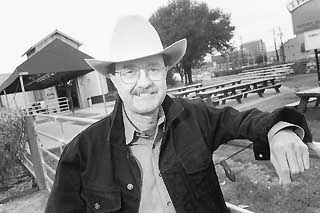Benevolent Agitator
Jim Hightower's Undiluted Populism
By Clay Smith, Fri., Feb. 11, 2000

If the Gods Had Meant Us to Vote, They Would Have Given Us Candidates
by Jim HightowerHarperCollins, 356 pp., $25
The beginning of Jim Hightower's new book is priceless: Twenty "buffed-and-grinning aspirants for state legislator, county constable, hide inspector, and whatnot" are seated at the head table of a bipartisan meet-the-candidates breakfast. A preacher is there, in the middle of them all. "He gripped the lectern as the crowd instinctively hushed and bowed," Hightower writes. "Before uttering a word, the preacher looked deliberately down the line of candidates to his right, then turned and gazed upon those to his left, after which he closed his eyes unusually tight, not so much in prayer, but as though he hoped to block out the sight he'd just taken in. Lifting his face to the heavens, he thrust his arms wide and cried in a booming voice that clearly was seeking deliverance: "Oh, God!' As his plea rumbled across the room, he softly said, "Amen' -- and sat down." Hightower's love of a good story is infectious, and it clearly has kept him going all these years -- anyone with enemies like his needs to dip from a very special well indeed.
In the course of 356 stunningly hilarious and earnest pages, Hightower, also the author of There's Nothing in the Middle of the Road but Yellow Stripes and Dead Armadillos (1997) and a two-term state agriculture commissioner, takes on the status quo in all its stagnant, harmful manifestations, from the cynical, unctuous, political consultants who help ensure that no serious discussion of the issues ever occurs to the self-deluded national media to economic "experts" who propagandize America's supposed economic prosperity. "The impact of this mercenary invasion of American democracy has been devastating," Hightower writes, "reducing elections to computerized cynical exercises in which the people are irrelevant, and such niceties as issues, ethics, and the future of the nation are beside the point."
Indoctrination is not Hightower's aim, however. His self-described "undiluted populism" is witty, rousing, and always engaging:

He also doggedly assigns the most noble motives to his readership. Hightower's faith in the inherent goodness of the downtrodden keeps him aglow with incendiary fervor and is crucial to understanding his world view. Mentioning his call-in radio show Hightower's Chat & Chew, Hightower writes that he is "impressed day in and day out by how smart and informed the rank and file American people are -- and how good-spirited and funny they are." Perhaps the only way to survive writing page after page after page about swindling politicians, backbreaking sweatshops, and ubiquitous garden-variety liars is to insist that there is a built-in mechanism in us that doesn't want those conditions. If there were a single shred of boredom to his writing, you might say that reading Jim Hightower is like self-help for the politically frustrated (his randy, vivacious intelligence excludes him from that dubious categorization). Thank God we still have someone who believes that "people want a politics with meaning and passion, that's worth getting embroiled in a fistfight."
But Hightower's view of human nature seems schematic (working class: good; ruling class: bad). At one point, Hightower introduces Flo:
Flo is a waitress at the Dine & Go Diner, where she works an early breakfast shift, six to nine. Then she goes downtown to the law offices of Meager, Wages & Miser, where she's a "legal aide" (much like a plow mule is a "farm aide"), doing grunt work ten to four for a bevy of insurance company lawyers. Ironically, Flo doesn't have insurance. She does have a couple of great kids, though -- Kim, twelve, and Zach, seven -- and she considers them her real job, though she is stretched mighty thin on time and energy and wishes she was with them more frequently. She's also taking a couple of night courses at the community college, trying to get ahead.
I want to meet Flo. I suspect she hovers slightly above ground level, strums a harp, and wears a halo. This is Hightower's benevolence at its least effective. Where are the ambiguities? There must be at least a few days every year when Flo doesn't get out of bed just to thwart her hopeless routine or days when she refuses to help her children with their homework because she has absolutely no time to herself. Hightower acknowledges that he is "hopelessly idealistic," but to have a full idealism, you have to start from the very bottom. To his credit, though, Hightower does treat the "messy reality" of the militia, saying that it's dangerous to poo-poo this "skulking movement." Militias consist of people we know, he asserts. "They're the family farmers of the eighties and nineties who were suckered by governmental policies that got them way overextended on farm credit while at the same time pushing massive overproduction that busted their crop prices, then allowed the bankers and hustlers to waltz in and merrily rip their land, livelihood, and pride from them."
Hightower is such an engaging and effective writer that he is able to lock readers into a dialogue whose refreshing tone makes the idea of escaping undesirable. He is so plain-spoken, honest, trusting, and inspiring that he just may be the political observer who is able to attract new readership and preach to those who aren't already converted. ![]()
Jim Hightower will be at BookPeople Thursday, February 17, at 7pm.








